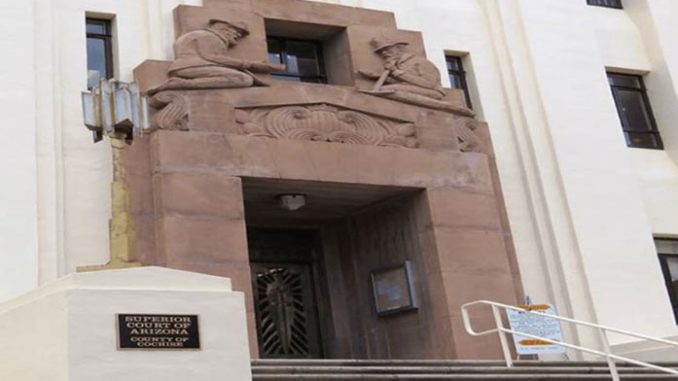
A judge has awarded a Huachuca City man nearly $2,000 as sanctions against the Cochise County Attorney’s Office after one of its attorneys gave legal advice which caused the county treasurer to ignore a September court order.
Dale Leon Peet will receive $1,927.61 in attorney’s fees and costs for having to ask Judge Terry Bannon in November to reaffirm her earlier order that County Treasurer Cathy Traywick issue a Treasurer’s Deed to Peet by Oct. 21, 2022, in a tax lien foreclosure case.
The deed in question was not issued until Nov. 17, several days after Peet’s attorney, Robert Stachel, asked Bannon to bring Traywick before the court for an Order to Show Cause (OSC) hearing on why the longtime treasurer violated the judge’s September order.
Stachel also asked that sanctions be imposed in the form of reimbursement to Peet for the additional legal expenses incurred to push for compliance of the order. The longer it takes for a new lawful owner of a property to receiver a Treasurer’s Deed means delays in the ability to sell the property, build on it, or use it as collateral for a loan.
Bannon’s Jan. 20 ruling granting fees to Peet was not unexpected, given that Deputy County Attorney Paul Correa admitted during the recent OSC hearing he provided the legal advice which caused Traywick to not issue the deed by the court ordered deadline.
However, Correa argued the matter was moot and should be dismissed because Peet already had his deed. It was an argument soundly rejected by Bannon, herself a former deputy county attorney.
“While the issue of the deed may be moot, the motion for sanctions is not,” she wrote in the Jan. 20 order in favor of Peet. “No matter his reason, defense counsel erred when he instructed the Treasurer’s Office to disregard the time limit specified in the Court’s Order.”
Bannon’s ruling also sided with Stachel’s argument that Correa had the duty to initiate his own motion to amend the September order once it was clear Traywick would not meet the deadline.
“If defense counsel had concerns about the issuance of the deed, the rules of procedure require he file a motion before the Court stating the relief sought,” Bannon’s ruling notes. “This counsel failed to do, which gave rise to the OSC and placed his client in the position of having disobeyed a court order.”
Peet’s case dates back to February 2018 when a Certificate of Purchase (CP) was issued by Traywick’s office on a residential parcel in Huachuca City during a tax lien sale for delinquent taxes. The CP was lawfully assigned to Peet in May 2021.
Steps can be initiated to foreclose the CP three years after issuance in an effort to eventually get a Treasurer’s Deed putting the property in the name of the CP holder. Peet retained Stachel to assist with that process, and a Notice of Intent to Foreclose was issued in February 2022.
Over the next several months Stachel continued the process to obtain the deed in Peet’s name, including notices to the owner of record and others who possibly had a legal claim to the property. When no one came forward to make claim, the attorney filed an application for entry of default in August 2022.
This led to a Sept. 20 hearing at which Bannon signed an Order directing Traywick to execute a Treasurer’s Deed conveying the property to Peet “within 30 days” once the appropriate fees were paid. The parties agree the signed order and payment was presented to Traywick’s office the next day.
But then Stachel and his staff began to receive various reasons why the deed could not be issued in Peet’s case.
One reason alleged Stachel’s paperwork did not properly include information about a manufactured home on the property. Stachel was able to quickly show the county’s own records refuted any issue related to the residence.
Another of the reasons given for not issuing the deed was a purported error with the property’s parcel number on the paperwork. The treasurer’s office later withdrew that claim, but as of Nov. 2 Stachel’s office was still being told the deed was not available.
The Treasurer’s Deed in Peet’s name was finally issued nearly one month past Bannon’s ordered deadline and nine days after Stachel’s Nov. 8 request to the judge for the OSC hearing.
At that hearing, Correa argued Cochise County was not responsible for any of Peet’s legal costs, as Traywick conducted her duties “timely” and “expeditiously” in part to ensure the future paper trail supporting the Treasurer’s Deed is clear and accurate.
Bannon noted during the hearing she found “no ill will” by Traywick or Correa for wanting to identify potential future problems. But she noted such efforts are “a courtesy” and not required by state law nor a justification to violate a court order.
And Bannon was equally unmoved by another of the county’s arguments against sanctions.
Correa pointed out that the holder of CP cannot begin the tax lien foreclosure process until three years after a CP is issued. Thus, waiting weeks more to receive the Treasurer’s Deed after it is ordered “isn’t a prejudice,” he told Bannon.
Bannon rejected that argument, noting in her Order for sanctions it “bears no relation to the merits of the OSC.” What matters, the judge noted, was that Traywick did not issue the deed on time due to “counsel’s instruction to his client.”
